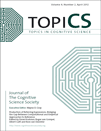
Topics in Cognitive Science
Scope & Guideline
Transforming Research into Understanding and Application
Introduction
Aims and Scopes
- Cognitive Development and Learning:
Research exploring how cognitive abilities develop over time, particularly in children, including the role of educational systems, social interactions, and environmental influences. - Language Processing and Use:
Investigating the intricacies of language comprehension and production, including the neurocognitive mechanisms involved and the intersection between language and thought. - Human-AI Collaboration:
Examining how humans and artificial intelligence systems can effectively work together, focusing on cognitive models, decision-making, and the dynamics of teamwork. - Cognitive Architecture and Modeling:
Developing theoretical frameworks and computational models that simulate cognitive processes, enhancing our understanding of human cognition through empirical data. - Social Cognition and Collective Intelligence:
Studying the cognitive dynamics within groups, including how collective memory, decision-making, and social influences shape individual and group behavior. - Multimodal and Embodied Cognition:
Exploring how physical gestures, sensory experiences, and environmental interactions contribute to cognitive processes and how these are represented in the brain.
Trending and Emerging
- Predictive Processing Models:
There is a growing interest in predictive processing frameworks that explain cognition as a series of predictions and updates, influencing various areas from perception to decision-making. - Human-Autonomy Teams:
Research on the collaboration between humans and autonomous systems is gaining traction, reflecting the increasing relevance of AI in cognitive tasks and the need to understand these interactions. - Multimodal Communication:
Exploring the roles of gestures, visual cues, and other non-verbal forms of communication in cognitive processes is on the rise, highlighting the importance of a holistic view of cognition. - Social Media and Collective Behavior:
As social media continues to shape human interaction, studies examining its impact on collective cognition, radicalization, and belief formation are becoming more prominent. - Ecological and Environmental Cognition:
Emerging themes focus on how cognitive processes relate to ecological concerns, sustainability, and human-environment interactions, reflecting a broader societal shift towards environmental issues.
Declining or Waning
- Traditional Theories of Memory:
There has been a noticeable decrease in publications centered on classical memory theories, such as the multi-store model, as newer frameworks emphasizing dynamic and contextual aspects of memory gain prominence. - Static Models of Cognition:
Research relying on static or overly simplistic models of cognitive function is becoming less frequent, as the field increasingly embraces complexity and dynamism in cognitive processes. - Individual Differences in Isolation:
While individual differences remain important, there is a waning emphasis on studying them in isolation, with a shift towards understanding how these differences interact within social and collaborative contexts. - Cognitive Neuroscience Without Integration:
Research that examines cognitive neuroscience in isolation from cognitive psychology or artificial intelligence is declining, with a growing trend towards integrative approaches that combine insights from multiple disciplines.
Similar Journals

COGNITIVE NEUROPSYCHOLOGY
Innovating Insights in Neuropsychology and CognitionCOGNITIVE NEUROPSYCHOLOGY, published by ROUTLEDGE JOURNALS, TAYLOR & FRANCIS LTD, is a premier academic journal that has established itself as a vital resource in the fields of cognitive neuroscience, neuropsychology, and psychology since its inception in 1984. With an esteemed impact factor that reflects its significance within the academic community, this journal is classified in the Q1 category for Arts and Humanities (miscellaneous) and Q2 in various other fields, including Cognitive Neuroscience and Developmental Psychology, based on the latest evaluation of 2023. COGNITIVE NEUROPSYCHOLOGY provides a platform for the dissemination of innovative research findings and theoretical advancements that deepen our understanding of cognitive processes and behavior in relation to neural systems. The journal also boasts a robust Scopus ranking, ensuring that articles published are of the highest caliber. Though it follows a traditional publishing model, the journal's commitment to rigorous peer review guarantees that it remains an authoritative voice for researchers, professionals, and students devoted to advancing knowledge in these critical areas of study.

Journal of Cognition and Culture
Advancing Understanding of Culture Through Cognitive LensesThe Journal of Cognition and Culture, published by BRILL, stands as a pivotal resource in the fields of Cultural Studies, Social Psychology, and Experimental and Cognitive Psychology. With an ISSN of 1567-7095 and E-ISSN of 1568-5373, this scholarly journal has been contributing to the academic discourse since 2001 and continues to provide insights into the interplay between cognitive processes and cultural phenomena. Based in the Netherlands, it boasts impressive rankings, including Q2 in Arts and Humanities (Miscellaneous) and Q1 in Cultural Studies for 2023, reflecting its significance in addressing complex cognitive and cultural issues. Although it operates under a traditional access model, the journal's commitment to rigorous peer review and high-impact research ensures its relevance and authority in the field. Researchers, educators, and students alike will find the articles and studies published herein an invaluable addition to their understanding of how cognitive functions shape, and are shaped by, cultural contexts.

EXPERIMENTAL PSYCHOLOGY
Innovating insights into the intricacies of human behavior.EXPERIMENTAL PSYCHOLOGY is a premier journal dedicated to advancing the field of psychology through rigorous empirical research and innovative theoretical insights. Published by HOGREFE PUBLISHING CORP, this esteemed journal features an array of studies that delve into cognitive processes, experimental methodologies, and the intricate workings of human behavior. With a significant impact factor, EXPERIMENTAL PSYCHOLOGY holds a Q1 ranking in Arts and Humanities and maintains a commendable presence in the realms of Experimental and Cognitive Psychology. By providing Open Access options, the journal ensures that vital psychological research is widely accessible, fostering collaboration and knowledge sharing among researchers, practitioners, and students worldwide. Based in the United States, it has been a cornerstone of psychological literature since 1998, continuing to shape the discourse in its diverse and interdisciplinary scope. Researchers seeking to contribute to or stay informed about the latest advancements in psychological science will find EXPERIMENTAL PSYCHOLOGY an invaluable resource.
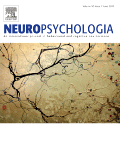
Neuropsychologia
Illuminating the Interplay of Brain and BehaviorNeuropsychologia, published by PERGAMON-ELSEVIER SCIENCE LTD, is a premier journal that delves into the intersections of psychology and neuroscience, specifically focusing on behavioral and cognitive processes. Since its inception in 1963, this esteemed journal has been a vital platform for researchers, professionals, and students, showcasing innovative studies and advancements in the fields of Behavioral Neuroscience, Cognitive Neuroscience, and Experimental Psychology. With a commendable impact factor, placing it in the Q2 category across multiple disciplines, Neuropsychologia is recognized for its contribution to the scientific community, ranking among the top journals in both Experimental and Cognitive Psychology and Neuroscience. The journal's commitment to excellence is evident in its rigorous peer-review process and its mission to disseminate cutting-edge research, making it an invaluable resource for those seeking to expand their knowledge and insights in neuropsychology. For further reading, the journal is accessible in both print and digital formats, ensuring that researchers can easily engage with the latest findings and theoretical advancements in this dynamic field.

Cognitive Research-Principles and Implications
Unveiling the Dynamics of Cognitive Processes.Cognitive Research: Principles and Implications, published by SPRINGER, is a premier open-access journal dedicated to the dynamic field of cognitive neuroscience and experimental psychology. Since its inception in 2016, this journal has rapidly established itself as a leading platform for disseminating innovative research, achieving impressive rankings of Q1 in both Cognitive Neuroscience and Experimental and Cognitive Psychology in 2023. With a Scopus ranking of #16 out of 165 in Experimental and Cognitive Psychology and #28 out of 115 in Cognitive Neuroscience, it serves as a vital resource for researchers and practitioners eager to explore the intricacies of cognitive processes. Operating from its base in the United Kingdom, the journal offers open access to its articles, ensuring that groundbreaking research is widely available and can influence both academic inquiry and real-world applications. As the field continues to evolve, Cognitive Research: Principles and Implications remains an essential reference point for advancing understanding in cognitive science, making it an indispensable tool for students, professionals, and academics alike.

ANIMAL COGNITION
Transforming Perspectives on Animal Minds through Rigorous ScienceANIMAL COGNITION is a prestigious academic journal dedicated to the exploration of cognitive processes in non-human animals, bridging the fields of ecology, evolution, behavior, and cognitive psychology. Published by Springer Heidelberg in Germany, this journal has established itself as a leading platform for innovative research since its inception in 1998, showcasing important findings that enhance our understanding of animal minds. With an impressive impact factor reflected in its Q2 rankings within both the Ecology, Evolution, Behavior, and Systematics and Experimental and Cognitive Psychology categories, ANIMAL COGNITION serves as an invaluable resource for researchers, professionals, and students alike. Although it currently does not offer open access, the journal's rigorous peer-review process ensures the highest quality of published research, making it a vital component of scholarly discourse in the study of animal cognition. As the journal continues to evolve into 2024 and beyond, it remains committed to advancing our knowledge while inspiring future generations of researchers in this fascinating field.
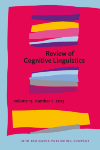
Review of Cognitive Linguistics
Fostering Interdisciplinary Dialogue in Language StudiesThe Review of Cognitive Linguistics, published by John Benjamins Publishing Co, is a premier academic journal dedicated to the exploration of cognitive approaches to linguistics. With an ISSN of 1877-9751 and E-ISSN 1877-976X, this journal provides a critical platform for researchers and professionals to disseminate their findings in the rapidly evolving fields of linguistics and language, alongside developmental and educational psychology. Hailing from the Netherlands, the journal boasts impressive standing within the academic community, as indicated by its 2023 Q1 ranking in Linguistics and Language and Q3 in Developmental and Educational Psychology. Additionally, its Scopus rankings reflect a strong position within the arts and humanities and social sciences categories. While currently operating under a traditional access model, this journal actively contributes to the overarching discourse within cognitive linguistics, and is a vital resource for those aiming to deepen their understanding of the intricate link between language and cognition. Researchers, educators, and students are encouraged to engage with the rich body of articles spanning its convergence years from 2010 to 2024, making it an essential read for those at the forefront of these interdisciplinary studies.
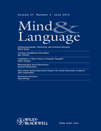
MIND & LANGUAGE
Fostering Scholarly Dialogue on Mind and LanguageMIND & LANGUAGE, published by WILEY, is a premier academic journal that has established itself as a leading platform for interdisciplinary research at the intersection of linguistics, philosophy, and cognitive science. With a noteworthy impact factor and a remarkable ranking in the top quartiles (Q1) for both Linguistics and Language as well as Philosophy, it reflects the journal’s robust contribution to the academic community, garnering attention from researchers and scholars worldwide. Since its inception in 1986, MIND & LANGUAGE has provided an avenue for exploring the complexities of language perception, cognitive processes, and the philosophical implications of linguistic studies. Its comprehensive scope ensures that it remains a critical resource for professionals and students alike who are engaged in the exploration of language's role in human thought and society. The journal's rigorous peer-review process guarantees the high quality and scholarly integrity of the published work, making it an essential addition to any academic library.
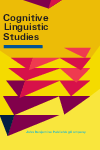
Cognitive Linguistic Studies
Fostering Interdisciplinary Dialogues in Cognitive LinguisticsCognitive Linguistic Studies is a prestigious journal published by JOHN BENJAMINS PUBLISHING CO, dedicated to advancing the interdisciplinary field of cognitive linguistics. With an ISSN of 2213-8722 and an E-ISSN of 2213-8730, the journal serves as an essential platform for the dissemination of high-quality research that delves into the intricate relationships between language, thought, and cultural contexts. Located in the vibrant academic milieu of the Netherlands, this journal has gained recognition for its impactful contributions, reflected in its respectable Q2 category ranking within the field of Linguistics and Language as of 2023. Redesigned to accommodate a broader audience, the journal welcomes original research articles, reviews, and theoretical discussions that bridge cognitive science and linguistic inquiry. As the journal continues its trajectory of growth, being indexed with a solid Scopus rank of #459 out of 1167 in the social sciences, it remains a vital resource for researchers, professionals, and students eager to explore the dynamic interplay between cognition and language.
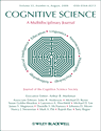
COGNITIVE SCIENCE
Charting New Territories in Human ThoughtCOGNITIVE SCIENCE, published by WILEY, is a leading academic journal that delves into the complexities of human cognition through an interdisciplinary lens. With an ISSN of 0364-0213 and an E-ISSN of 1551-6709, this journal has made significant strides in the field since its inception in 1977, ample coverage through to 2024, and a commendable Q1 and Q2 categorization in Experimental and Cognitive Psychology and Cognitive Neuroscience as of 2023. The journal is positioned at the intersection of various disciplines, ranking #65 out of 165 in Experimental and Cognitive Psychology and #58 out of 115 in Cognitive Neuroscience, highlighting its relevance and contribution to advancing knowledge in these areas. Although it does not offer open access, COGNITIVE SCIENCE remains an essential resource for researchers, professionals, and students seeking to explore groundbreaking research and theoretical insights within the vast domain of cognitive science.